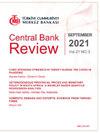The nonlinear nexuses between monetary policy, household indebtedness, and household consumption: Evidence from Korea
IF 1.2
Q2 ECONOMICS
引用次数: 0
Abstract
Household indebtedness in Korea has surged persistently during 2003-2022. Low interest rates, coupled with escalating housing prices, are the key drivers of growing household debt. In this context, monetary tightening may play an opposite role to conventional monetary policy. Moreover, inordinate indebtedness likely acts as a deterrent to household consumption. Using threshold regression, this study explores the nonlinear nexus between monetary policy and household debt, as well as the nexus between household consumption and debt in Korea. The results reveal that an increase in the monetary policy rate boosts household debt in a regime with values beyond the threshold of the nominal (real) housing sales price index approximately 61.3 and 63.9 (80.7) for regressions on the regime-specific nominal and real policy rates, respectively. This implies that monetary tightening can enhance household debt due to high housing price expectations. Furthermore, an increase in household indebtedness suppresses household consumption when the household debt-to-annual GDP ratio is above the thresholds of approximately 84% and 82% for regressions on household debt growth and household debt-to-GDP ratio growth, respectively. These findings suggest that, under low interest rates, in the face of high housing prices and “excessive” household indebtedness, monetary tightening and debt expansion are unviable courses of action for resolving growing household indebtedness and declining household consumption. Therefore, when regulating the policy rate to control household debt and spending effectively, it is crucial to maintain housing prices and household indebtedness at desirable levels. In tandem with this, additional policy instruments such as macroprudential and housing-related fiscal regulations may also be needed to attain financial stability.
货币政策、家庭负债和家庭消费之间的非线性联系:来自韩国的证据
2003年至2022年,韩国家庭负债持续增加。低利率加上不断上涨的房价,是家庭债务不断增长的主要驱动因素。在这种背景下,货币紧缩可能会发挥与传统货币政策相反的作用。此外,过度负债可能会阻碍家庭消费。运用阈值回归,本研究探讨了韩国货币政策与家庭债务之间的非线性关系,以及家庭消费与债务之间的关系。结果表明,货币政策利率的增加增加了一个制度的家庭债务,其价值超过了名义(实际)住房销售价格指数的阈值,分别为特定制度的名义和实际政策利率的回归约61.3和63.9(80.7)。这意味着,由于高房价预期,货币紧缩可能会增加家庭债务。此外,当家庭债务与年GDP之比分别高于家庭债务增长和家庭债务与GDP之比增长回归的大约84%和82%的阈值时,家庭债务的增加会抑制家庭消费。这些发现表明,在低利率下,面对高房价和“过度”家庭负债,货币紧缩和债务扩张是解决日益增长的家庭负债和下降的家庭消费的不可行的行动方针。因此,在调控政策利率以有效控制家庭债务和支出的同时,将房价和家庭债务维持在理想水平至关重要。与此同时,可能还需要其他政策工具,如宏观审慎和与住房有关的财政监管,以实现金融稳定。
本文章由计算机程序翻译,如有差异,请以英文原文为准。
求助全文
约1分钟内获得全文
求助全文

 求助内容:
求助内容: 应助结果提醒方式:
应助结果提醒方式:


